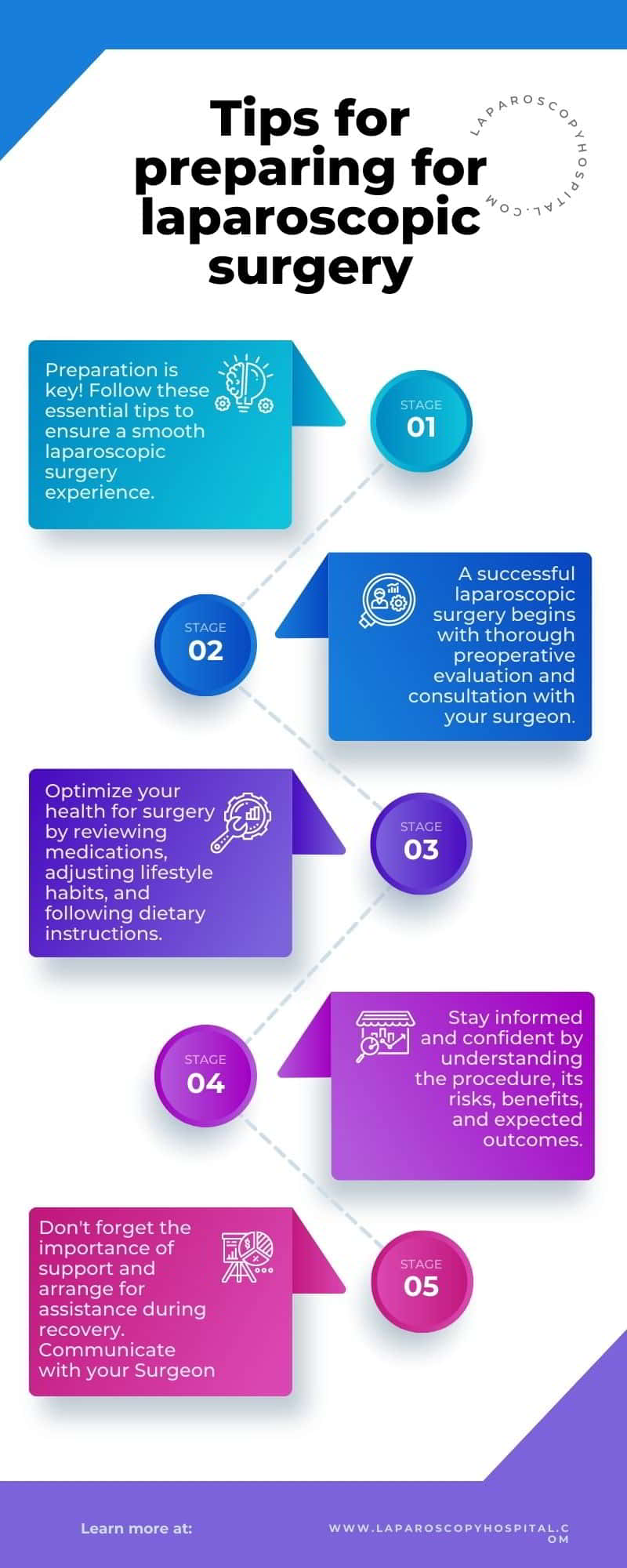Preparing for laparoscopic surgery can be a crucial step, especially for older individuals like a 90-year-old. It's important to ensure the best possible outcome and minimize any potential risks. Here are some tips for preparing for laparoscopic surgery.
-
Consultation with the Surgeon: Schedule a thorough consultation with the surgeon well in advance. Discuss your medical history, current medications, and any pre-existing conditions. Understand the risks and benefits of the procedure, and address any concerns or questions you may have.
-
Medical Evaluation: The surgeon will likely recommend a series of preoperative tests to evaluate your overall health. These may include blood tests, electrocardiogram (ECG), chest X-ray, and possibly other imaging studies. These tests help identify any underlying conditions that may impact the surgery or anesthesia.
-
Medication Review: Provide your surgeon with a complete list of medications, including prescription drugs, over-the-counter medications, and supplements. Some medications may need to be temporarily discontinued before surgery, as they can interfere with blood clotting or anesthesia. Follow the surgeon's instructions regarding medication adjustments.
-
Lifestyle Modifications: In the weeks leading up to the surgery, make healthy lifestyle choices. Eat a balanced diet rich in fruits, vegetables, and whole grains, and avoid excessive fatty or processed foods. Engage in light physical activity if approved by your doctor to maintain or improve your overall fitness level.
-
Stop Smoking: If you smoke, it is strongly advised to quit before the surgery. Smoking can impair lung function and slow down the healing process. Consult your healthcare provider for assistance or resources to quit smoking.
-
Follow Preoperative Instructions: Your surgeon will provide specific instructions to follow before surgery. This may include fasting for a certain period before the surgery to ensure an empty stomach. Follow these instructions carefully to prevent complications during and after the surgery.
-
Arrange for Help: It's important to have someone accompany you to the hospital on the day of the surgery, as well as to help you during the initial days of recovery. They can assist with transportation, and daily activities, and provide emotional support.
-
Prepare Your Home: Make your living environment safe and comfortable for post-surgery recovery. Remove any tripping hazards, ensure good lighting, and place essential items within easy reach. Consider installing handrails in the bathroom and along staircases if necessary.
-
Coordinate with Healthcare Providers: Inform your primary care physician and any other healthcare providers about the upcoming surgery. They can provide any necessary medical records, collaborate with the surgical team, and coordinate your postoperative care.
-
Mental and Emotional Preparation: Surgery can be stressful, especially for older individuals. Practice relaxation techniques, such as deep breathing exercises or meditation, to help manage anxiety. Stay positive and maintain open communication with your surgeon and loved ones.
Remember, each individual is unique, and it's crucial to follow the specific guidance provided by your healthcare team. By preparing thoroughly, you can help ensure a successful laparoscopic surgery and a smoother recovery process for a person.

Preparing for gynecological laparoscopic surgery requires some specific considerations. Here are some tips for preparing for laparoscopic surgery for a woman undergoing gynecological procedures:
-
Choose a Skilled Surgeon: Find a skilled and experienced gynecological surgeon who specializes in laparoscopic procedures. Research their qualifications, expertise, and success rates. Request recommendations from your primary care physician or trusted gynecologist.
-
Consultation and Preoperative Evaluation: Schedule a comprehensive consultation with the surgeon to discuss the details of the surgery. Provide a detailed medical history, including any previous gynecological surgeries, pregnancies, and relevant medical conditions. Undergo a complete gynecological examination and any necessary preoperative tests, such as blood work, ultrasound, or imaging studies.
-
Understand the Procedure: Ask your surgeon to explain the specific details of the laparoscopic surgery. Understand the purpose, potential risks and complications, expected outcomes, and the postoperative recovery process. Take the opportunity to address any concerns or questions you may have.
-
Medication Review: Inform your surgeon about all the medications you are currently taking, including prescription medications, over-the-counter drugs, and supplements. Some medications, such as blood thinners or hormonal therapies, may need to be temporarily stopped or adjusted before the surgery. Follow your surgeon's instructions regarding medication management.
-
Birth Control: Discuss birth control options with your surgeon if applicable. Depending on the nature of the gynecological surgery, it may impact future fertility or contraceptive needs. If necessary, plan for alternative contraceptive methods before and after the surgery.
-
Bowel Preparation: Some gynecological laparoscopic surgeries may require bowel preparation to ensure a clear surgical field. Your surgeon will provide specific instructions regarding diet modifications and any required laxatives or enemas to cleanse the bowel before the surgery.
-
Preoperative Fasting: Follow your surgeon's instructions regarding fasting before the surgery. Typically, you will be advised not to eat or drink anything for a certain period before the procedure to ensure an empty stomach.
-
Lifestyle Modifications: Maintain a healthy lifestyle before the surgery. Eat a balanced diet, engage in regular physical activity within your limits, and avoid smoking or excessive alcohol consumption. These lifestyle factors can contribute to smoother recovery and overall well-being.
-
Arrange for Support: Coordinate with a family member or friend who can accompany you to the hospital on the day of surgery. They can provide support, transportation, and assistance during the initial recovery phase. Ensure they are aware of the estimated duration of the surgery and any postoperative care instructions.
-
Postoperative Recovery Plan: Discuss the postoperative recovery plan with your surgeon. Understand the expected duration of hospital stay, limitations on physical activity, and any necessary follow-up appointments. Make arrangements for someone to help you with household chores and childcare responsibilities during the recovery period.
Remember to closely follow the specific instructions provided by your surgeon and healthcare team. By adequately preparing for gynecological laparoscopic surgery, you can optimize your chances for a successful procedure and smooth recovery.